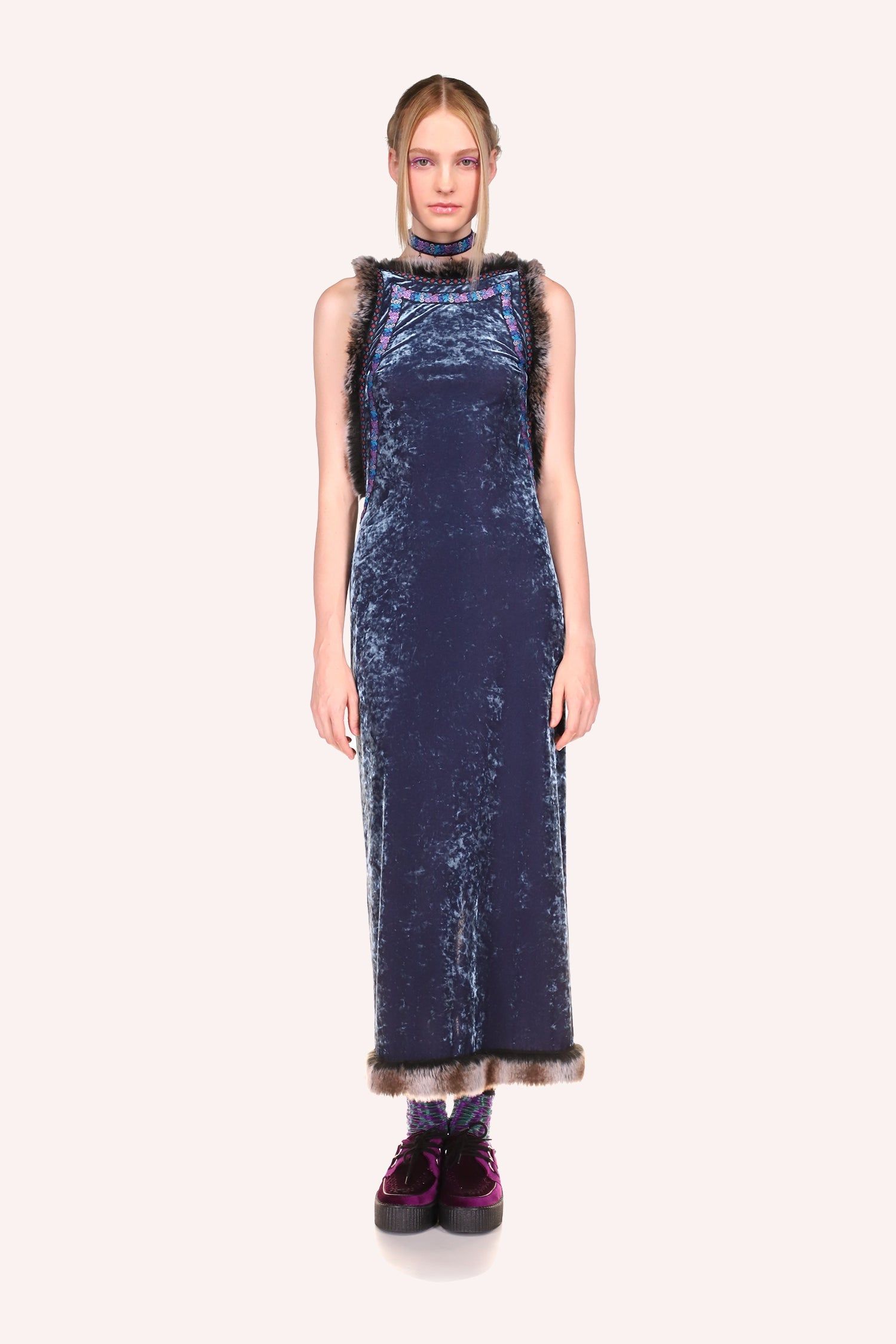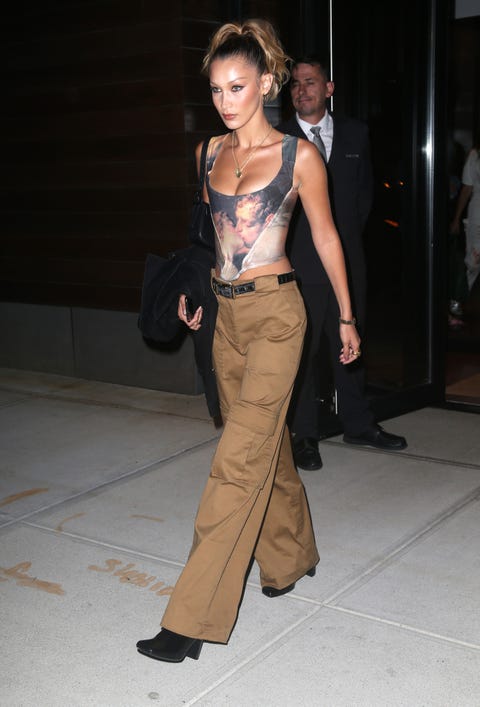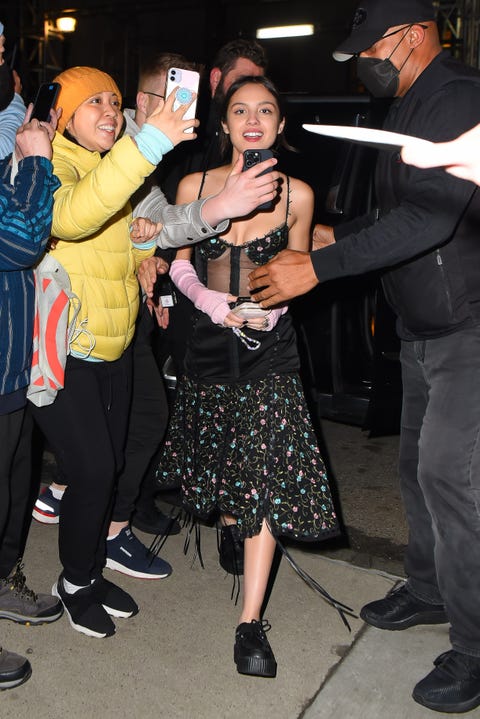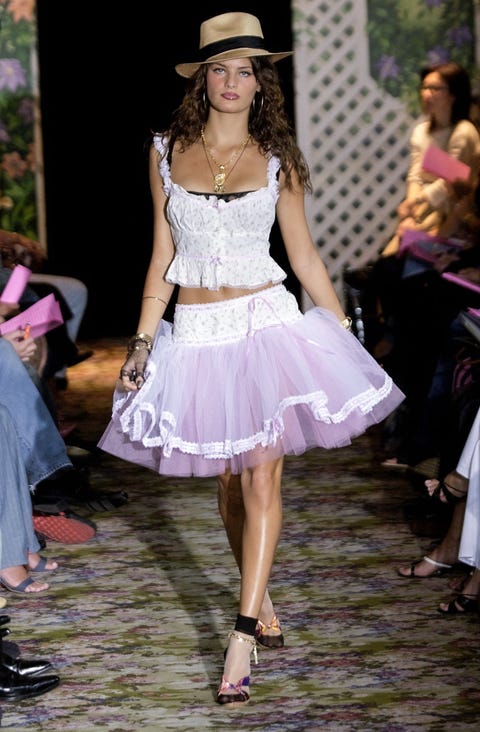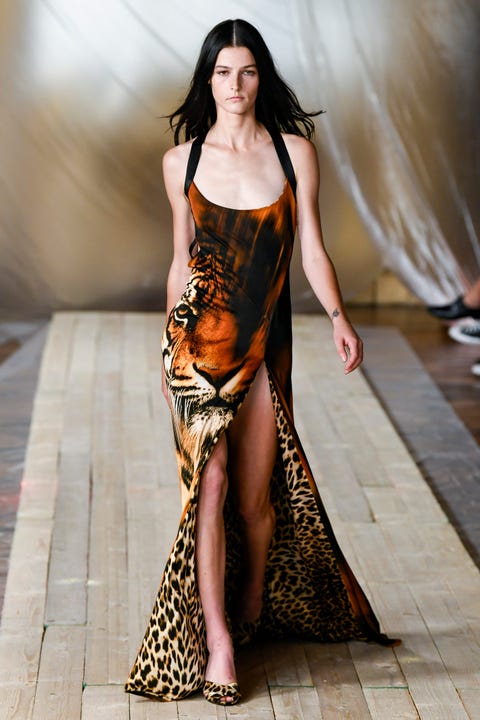Why Is Fashion So Obsessed With Itself?
Fashion has officially become infatuated with the idea of archives. It’s wildly ubiquitous; now as common as a pair of jeans or an old leather belt stashed in the back of your closet. From people on TikTok marveling over their personal collections and labeling items down to the minute details of exact season and runway look number, to designers themselves diligently hunting down their own work in the secondhand market, it surpasses clothing and garments that are simply vintage, and is more specifically linked to extremely rare runway pieces. In the world of archive fashion, everyone is a collector—but even the world’s top designers can’t get their hands on all their goods.
Earlier this year, Anna Sui came across a gray crushed velvet and fur-trimmed halter dress from her fall 1998 collection for sale on Poshmark and immediately DMed Casey Jackson, the blogger behind Seek the Finds, who posted it. “Hi this is Anna Sui. I saw you sold this already but I was wondering if it would be possible for me to buy it instead? We don’t have this sample and it would mean a lot for me to have it in my archive,” she wrote. The conversation went viral on Twitter. Just a few months later, for her resort 2023 collection, she reissued the infamous dress. “It’s strange; I never really looked back, because we were always so busy,” Sui says. “You never have time to really reflect. A lot of the clothes went from the showroom right into storage or garment bags. We never looked at them again.”
Celebrities, too, are opting for rare pieces straight from the archives, with stylist Law Roach leading the way. See: the excess and opulence of the Kardashian family at Kourtney Kardashian and Travis Barker’s wedding in ’90s Dolce & Gabbana, or Bella Hadid wearing Versace’s 1987 and 2001 archives on the Cannes red carpet. Here, vintage fashion is undoubtedly the new luxury, not to mention the ultimate status symbol—it’s wearable art you’re almost guaranteed that no one else will be wearing, since it’s usually one of one, with few stylists in the industry even having the know-how or pull to dig into a brand’s closely guarded oeuvre.
Unlike big-name European brands that have risen through the ranks to become the most well-known heritage labels worldwide, like, say, Dior, Gucci, Versace, and Chanel, smaller fashion names—despite having cult and often niche followings—don’t have the same kind of meticulous archive processes. So, designers are finding other ways to rebuild their archives—by shopping on Poshmark, eBay, Depop, as well as speciality archive resellers’ collections.
Dior, for example, has a collection of archives that has been in place since 1985, comprising Christian Dior’s own dresses, jewelry, hats, shoes, fabric swatches, and sketches, as well as work from other creative directors of the house. Valentino, on the other hand, has its own archives, but also has a dedicated archival buy-back program dubbed Valentino Vintage, allowing anyone to bring past season Valentino to select boutiques or online. And yet, so many designers that flourished in the ’90s are now scrambling to collect their own work from the past.
Take, for instance, Betsey Johnson’s early work, which pop culture icons like Olivia Rodrigo are wearing, collecting her vintage dresses en masse. The irony is, Johnson doesn’t have any of her archives. She sold her company in 2007 to Castanea Partners, a private equity firm based in Boston, and in 2010, Steve Madden bought the brand. In 2015, she decided to host a three-month long archive yard sale at her Hamptons home, where every piece was priced at $50 or less.
“I went through my archives and I decided, well, I’ll just keep five or 10 pieces from the ’60s, ’70s, ’80s, ’90s, and 2000s,” Johnson says. “I was able to give my girlfriends who have supported me for years, a treat—just giving them all this junk practically for free.” In 2015, Steve Madden decided to have a retrospective fashion show celebrating the brand, featuring the pieces that the designer saved. But something went awry after the show. “I don’t want to point any fingers, but, unfortunately, why I’m going online to buy so many of my pieces is because, by some little mistake, those runway fashion pieces were held in storage at Steve Madden, where they said they would love them and take care of them and never let it them be broken up and given out in any way,” she admits. “Well, long story short, they sold it all.”
Steve Madden declined to comment on the matter, but a rep for Betsey Johnson responded on the company’s behalf, citing, “In 2015, we had a fashion show, and around 10 to 20 items went missing. We have been working actively to replenish the archive.”
Johnson has now been scrolling through pages and pages of Poshmark and Etsy listings to buy back her iconic cupcake-like tiered prom dresses from the ’80s, ’90s, and early 2000s, along with her eccentric knitwear from the ’80s and her earlier work for the retro-futuristic New York City boutique Paraphernalia, where she worked as a designer in the mid-’60s. “I’m desperately yelling out to all the vintage dealers,” she says. “If you’ve got any of my stuff, email me, send me pictures, text me, because I need to recreate 55 years of my work. I didn’t think how important it might be one day.” So far, she has been focusing on prom dresses, one in particular from 1978 with a tulle skirt, corset, and inch-wide zipper. She also bought a few sequined dresses with ruffled bottoms and distorted stripe motifs, often paying far more for pieces than they originally retailed for. “My stuff that was selling for $125 or $85 is on 1stdibs for, like, $1,500 or $2,000,” she says. “It makes me feel great because I thil, ‘Whoa, after all these years, it’s gone up, and people have collected it and saved it.’”
Like Sui, Johnson is buying her pieces to rebuild her archive, but also for future collabs and potential reissues. She is working on securing a new licensing partner for prom dresses, and wants to model them after her original designs.
Even emerging designers are currently buying their archives on the secondhand market. “I’ve been DMing people for the best pieces I ever sold, now that I make enough money to buy them back,” says Mia Vesper, known for her glittery pieces worn by Beyoncé, and her trademark tapestry jackets. She has made hundreds of pieces, but only owns about 15. “Making money as an independent designer is nearly impossible. So of course, in the first four years of my career, if given the choice between making a sale or keeping a piece for my archive, I always chose the sale.”
On the runway, brands are visibly riffing from storied archives, and that’s another reason why some are looking to the internet to buy back certain pieces. “The reference of vintage has increased in the last three years,” says Pascal Conte-Jodra, managing director of Mugler. “There’s a strong desire for the brand from the newer generation, and they want to immerse themselves in the brand universe,” which often means pieces that look like they’re made by the original designer of the house, Thierry Mugler. While the brand has thousands of pieces in its archive, it is also on the hunt for pieces it doesn’t have. “We are also on the lookout for some pieces to enrich our current collection from vintage retailers and private collectors to ensure that we can protect our patrimony. And this is not just only for couture, but also for ready-to-wear collections.”
Glenn Martens, who works as the creative director for both Diesel and Y/Project, and served as the guest designer for Jean Paul Gaultier’s couture collection earlier this year, admits that much of Y/Project’s earlier work is not archived. But he has taken sartorial cues from the archives of Diesel and Jean Paul Gaultier in recent times, working a reinterpretation of Gaultier’s ’90s trompe l’oeil body prints into his fall 2022 menswear collection. “When you have such amazing, iconic designers, you can just close your eyes and see something in front of you,” he says of the value of the brand’s archives in the year 2022. “You really see a certain language in your products.” It’s obvious why Jean Paul Gaultier just reissued its iconic cyber prints from its fall 1995 show.
Kate Spade, the originator of the it-bag in the ’90s, is also on the lookout for archival pieces, but is sourcing them in a different sort of way. While the brand has an extensive archive of its prints and colors, the stock of handbags is not nearly as robust, since hundreds of different prints and colors were released over the years. Lately, the team has been referencing some of the original Sam bags to reimagine for new collections, finding pieces to add to the archive from longtime customers. “People are very devoted to Sam, and they keep them for 25, 30 years,” says Kristen Naiman, Senior Vice President of Brand Concept and Strategy at Kate Spade. “We’ve had people send them back and say, ‘Please remake this!’ We have a circular relationship with our customer.” She references a notable fan who recently sent in a multi-stripe Sam with a note about what that Sam had meant to her early in life. “This person was young when she got this first bag, and it meant everything to her. So she sent us this beautiful note and asked us to put it back in the archive.”
At the same time, Vivienne Westwood is experiencing a surge of popularity and interest in its archival pearl necklace and corset styles. While the brand has a comprehensive archive collection from the 1980s to present day managed by a team of four people in London, it has also sourced runway items from non-traditional places in the past, due to the fact that many of the designer’s early pieces were one-offs. “The very earliest pieces, in particular from the punk period of the 1970s and early 1980s, are limited due to the very nature of this historical moment,” says Murray Blewett, Head of Archive at Vivienne Westwood. “In the past, we’ve asked private collectors for the loan of key pieces, made as one-offs or in extremely limited numbers, that, more often than not, still remain in the hands of private individuals and not institutions or museums.” The label is currently looking for more items from the “Let It Rock” era in the early ’70s.
When brands can’t find their own archives out in the Wild West of the internet, it helps to turn to the pros. “In the last five to seven years, there’s been a huge uptick of designers buying their pieces back for their archive,” adds Jason Lyon of Morphew. “Before that, no one was buying for their archive. This whole concept of buying back their archive is a really new phenomenon within the last several years. I think it’s because a lot of them are becoming of a certain age, and they’re nostalgic for their own brands.” In the past few years, Morphew has sold a pink puff-sleeved ’70s Valentino couture gown to the brand, and ’90s-era Gianni Versace to Allegra Versace. In 2019, the store sold the infamous Roberto Cavalli tiger dress from fall 2000 to the designer himself, though he formally retired from his brand and the industry as a whole in 2014. “He bought a bunch of stuff, and he was buying it for his girlfriend to wear,” adds Lyon.
As fate would have it, the recently named creative director of Roberto Cavalli, Fausto Puglisi, takes heavy inspiration from the label’s archives, which are located in Florence, and put a major emphasis on that same tiger dress for spring. “Working with archives in 2022 is like Warhol-ish repetitive work,” he says. “It’s a souvenir; it breaks the boundaries of good and bad taste. And I love it.” What’s old and hard to get a hold of will always inspire—but in 2022, it’s been taken to an entirely new level.

Contributing Editor
Kristen Bateman is a contributing editor at Harper’s Bazaar. Her first fashion article was published in Vogue Italia during her junior year of high school. Since then, she has interned and contributed to WWD, Glamour, Lucky, i-D, Marie Claire and more. She created and writes the #ChicEats column and covers fashion and culture for Bazaar. When not writing, she follows the latest runway collections, dyes her hair to match her mood, and practices her Italian in hopes of scoring 90% off Prada at the Tuscan outlets. She loves vintage shopping, dessert and cats.


